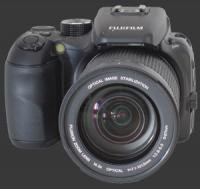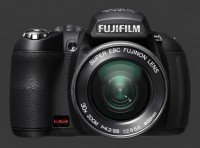Fujifilm Finepix HS20 EXR Review
Fujifilm Finepix HS20 EXR Performance - How well does it take pictures?

The Fuji Finepix HS20 EXR produces reasonable quality images with above average noise at its full 16 megapixels resolution. When using any 8 MP EXR mode such as Low-Noise Priority or Dynamic-Range Priority, images look dramatically better. While 8 megapixels is not a headline grabbing resolution, it is more than the vast majority of people need. High-quality prints up to 9"x12" are easily possible with that resolution. Electronic use such as online sharing, web-galleries, HDTV and digital projectors all require much less. Unfortunately, this performance prevents it from catching up Fuji's own S100FS and S200 EXR.
The HS20 EXR has three noise-reduction setting which compromise between noise and details. In all cases, print quality does not change much as noise gets replaced by smeared details. ISO 100 and 200 are good actually with a little noise and a little softness. ISO 400 looks a bit worst but considering the resolution there is not much to worry about. ISO 800 clearly affects print sizes while still look great at 9"x12". ISO 1600 is visibly one stop do far with completely soft results. No need to use higher sensitivities on a camera with such small pixels.
The ultra-wide 30X optical zoom lens is the the biggest achievement of the HS20 EXR. It performs incredibly well for such a range. Except for a softening towards the edges of the frame near the ultra-wide end of the range, around 24-27mm, sharpness is quite good. There is some noticeable barrel distortion near the ultra-wide end too. Zooming-in quickly replaces barrel distortion with some measurable but rarely visible pincushion distortion. There is no sign of vignetting throughout the zoom range. The HS20 EXR seems unaffected by chromatic aberrations. This is a significant improvement for Fujinon lenses, as this was traditionally their weak-point. Keen readers may notice that these observations are different from the HS10 which supposedly shares the same lens. All we can say is that this is either due to QA tolerances or changes to in-camera correction.

The lens starts at a bright F/2.8 maximum aperture and it closes down slowly while zooming in, only reaching the smallest maximum of F/5.6 passed 320mm. There is a 58mm thread for using optical filters.
Fuji's exposure system is good but seems to blow highlights a little more often than previously. This lets it produce brighter images that are more appealing to some consumers as they can be printed directly more often. The unfortunate problem is that the LCD and EVF do not preview exposure, so results are often be surprising. Still, typically the error margin is between 1/3 and 2/3 EVs.
Colors are generally good but over-saturated by default, even using Provia Film-Simulation. Setting the Color parameter to Low corrects the problem and produces natural-looking colors. White-balance is also generally good, certainly on par with most good ultra-zooms. There is a yellow cast to images taken under incandescent light in automatic but the 6 presets are good and custom white-balance is close to perfect.
The speed of the Fuji Finepix HS20 EXR is mostly average. A few numbers like a startup time of 2 seconds are average. Some are better, like the quick shutter-lag and power-off time of under 1s. Focus speed is not so great between ½s and 1½s, tending mostly around 1s. At just over 2s, shot-to-shot speed is average. Despite the speed of its burst modes, this camera is not ideal for action photography. Otherwise, this digital camera generally remains responsive. Except while recording an image, a button press is usually answered almost immediately.

Entering and exiting playback mode is quite fast. Since this is a shooting-priority camera, it instantly goes back into shooting mode when pressing the shutter halfway. Scrolling and zooming through images is fast. Panning speed is very good at high maginification but gets slower as magnification decreases.
This is one of the few remaining digital cameras to use AA batteries, the most convenient type of batteries. Compared to other types of batteries, they are very cheap. They also come in different types and disposable ones are available in most places. The Fuji Finepix HS20 EXR has excellent battery life and can take over 700-shots according to t he CIPA standard. In practice it depends on features used and amount of time spent reviewing images. Going through a day of shooting is no problem.
Fujifilm Finepix HS20 EXR Performance - How well does it shoot video?
The HS20 EXR can capture full HD video at 1920x1080 @ 30 FPS, also known as 1080p. Sound is recording along the video using a built-in stereo microphone mounted on either side of the lens. Videos can also be recording at 1280x720 @ 30 FPS, known as 720p, and VGA resolution of 640x480. This camera also offers high-speed video capture at 640x480 @ 80 FPS, 320x240 @ 160 FPS and 320x112 @ 320 FPS. While HD video is recording at a 16:9 widescreen aspect ratio, most high-speed video is recorded at 4:3. The only exception is the odd 320 FPS mode which has an odd aspect ratio which cannot be previewed, making setting up framing impossible.
Videos are stored in the Quicktime format using the H.264 codec. Very little compression artifacts are noticeable and you have to freeze-frame to be able to see them! Video quality is very good, with excellent sharpness and crisp details. Motion is captured smoothly as well. Exposure is dynamic but transitions rather smoothly, minimizing jumps in brightness. The stereo microphone is very sensitive which causes it to pick up wind too easily.

There are two focus modes for video: Center and Continuous. The Center mode simply focuses on the center of the first frame and locks it there. If the lens was previously focused at a different distance, then the first second of the video or is taken by the lens focusing. It would have been better if possible to focus before recording video using a half-press of the shutter. Since the HS20 EXR has a mechanical lens, it is easily possible to quietly zoom in and out. The only catch is that focus may be thrown off.
Continuous autofocus mode in video makes the HS20 EXR constantly focus on the center of the frame. It settles after a while but, depending on movements in the scene, videos can easily be more often out of focus than in. During a pan for example, the camera is constantly trying to refocus which gives some disturbing results. Given the unpredictable nature of this mode, it is probably better to avoid it and use Center mode instead.
Fujifilm Finepix HS20 EXR Conclusion

This ultra-zoom provides an excellent feature set in an ergonomic design which emphasizes efficiency and quick access to photographic controls. Its unique mechanical 30X ultra-wide angle optical zoom lens, shared with its predecessor, is a pleasure to use. This lens combined with a EXR CMOS sensor capable of capturing 1600% dynamic-range images makes it the most versatile fixed-lens digital camera to date. Adding the 8 FPS continuous drive at 16 megapixels and full 1080p HD video with stereo sound, the Fuji Finepix HS20 EXR marks itself as truly exceptional.
Optically, results are impressive with good sharpness away from the ultra-wide end of the zoom, low distortion, no vignetting and extremely good control over chromatic aberrations. While it gained such high-resolution and high-speed features, the HS20 EXR had to compromise on ultimate image quality at its maximum resolution. This shows up as noise-levels and smearing of details that are just above average and a clear step behind the Fujifilm Finepix S100FS
Fujifilm Finepix S100FS which firmly keeps its spot at the highest image quality ultra-zoom. That being said, Low-Noise Priority mode delivers by producing much cleaner results at 8 MP. Dynamic-Range Priority mode is another winner than manages to capture scenes of unprecedented dynamic-range.
As discussed in this review, performance of the HS20 EXR is reasonable but not exceptional. The camera responds with a short shutter-lag, average shot-to-shot speed and slightly slow autofocus. Battery-life is excellent though using easily available AA batteries.
Overall, the Fuji Finepix HS20 EXR is most suitable for just about any static scene, close or far. The real key is to use the right EXR mode to get the best performance according to the lighting situation. HD video performance is rather good but count in using Center AF mode and starting a new clip when the subject distance changes. While not giving the best image quality in its class, this digital camera clearly delivers on capability.
 |
Please Support Neocamera
All information on Neocamera is provided free of charge yet running this website is a huge endeavor. Purchases made via affiliate links found throughout the site help keep it running and up-to-date. There is no additional cost to you, so please consider buying via these links to our affilates:
If you found any information on this site valuable and did not purchase via our affiliate links, please considering donating via PayPal:
Any amount will be greatly appreaciated. Thank you for your support!
Fujifilm HS20 EXR Highlights

Sensor-Size: 6 x 5mm

Actual size when viewed at 100 DPI
| 16 Megapixels Ultra Zoom | ISO 100-3200 |
| 30X Mechanically Linked Ultra-Wide Optical Zoom | Shutter 1/4000-30s |
| Built-in Stabilization | Full manual controls, including Manual Focus |
| 0.20" Built-in EVF 200K Pixels | Custom white-balance |
| Automatic Eye-Start sensor | Spot-Metering |
| 1 Axis Digital Level | Hot-Shoe |
| 8 FPS Drive, 8 Images | Standard AA Battery |
| 1920x1080 @ 30 FPS Video Recording | Secure Digital Extended Capacity |
| 3" LCD 460K Pixels |
Updates
2025.01.18

Fujifilm GFX 2025 Lens Roundup
Lens Review roundup of Fujifilm GFX Medium-Format lenses. Quality, performance and handling of the GF20-35mm F/4R WR, GF30mm F/3.5 Tilt-Shift and the GF55mm F/1.7.
2024.11.18

Best 2024 Photography Gifts for Every Budget
Great gifts for photographers and photo enthusiasts selected for every budget among the best products of 2024.
2024.08.07

Eye Protection Tips for Professional Photographers
The four main considerations for professional photographers regarding eyewear.
2024.07.14

Fujifilm X100VI Review
Flagship fixed-lens compact digital camera with a 40 MP sensor and Image-Stabilization, a first for the series. Retro design featuring dual control-dials, plus direct ISO, Shutter-Speed and EC dials. Its hybrid viewfinder can switch between EVF and OVF mode.
2024.05.09

Fujifilm GFX100 II Review
Flagship 102 Megapixels Medium-Format Mirrorless Digital Camera with 8-Stop 5-Axis IBIS, 8 FPS Drive, 8K Video and 400 MP Super-Resolution capture in a weatherproof and freezeproof body with dual control-dials and dual memory-card slots.
2024.04.03

Fujifilm X-T5 Review
Newest Fujifilm flagship boasting a 40 MP APS-C sensor, 5-axis IBIS with 7-stop efficiency, 15 FPS continuous drive, 6.2K Video capture, dual control-dials and dual SDXC UHS-II slots in a sturdy weatherproof and freezeproof body.
2023.11.20

Best Digital Cameras of 2023
Find out which are the Best Digital Cameras of 2023. All the new Mirrorless Digital Cameras from entry-level to high-end professional.
2023.07.10

Fujifilm X-H2 Review
40 Megapixels APS-C Hybrid Mirrorless Digital Camera with 7-stop IBIS. Fastest shutter ever and 8K video capture. Large builtin EVF with 0.8X magnification and 5.8 MP, plus an Eye-Start Sensor. Packed with features and large number of controls in a weatherproof and freezeproof body.
2023.05.07

Sony FE 20-70mm F/4G Review
Review of the unique Sony FE 20-70mm F/4G lens. The optical zoom of this lens spans ultra-wide-angle and medium focal-length coverage, making it one of the most versatile Full-Frame lenses on the market.
2023.01.15

Huion Inspiroy Dial 2 Review
Review of the Huion Inspiroy Dial 2 tablet, a medium sized drawing surface with dual dials and customizable buttons. Connects via USB-C or Bluetooth 5.0 with Windows, Linux and Android support.
2022.12.08

How to Pack for a Photo Trip
Find out how to pack for a travel photography trip, carry your gear safely while meeting airline regulations.
2022.11.13

Best Digital Cameras of 2022
The best digital cameras of 2022. A short list of the most outstanding models in their respective categories. Choose one for yourself or as a gift.












